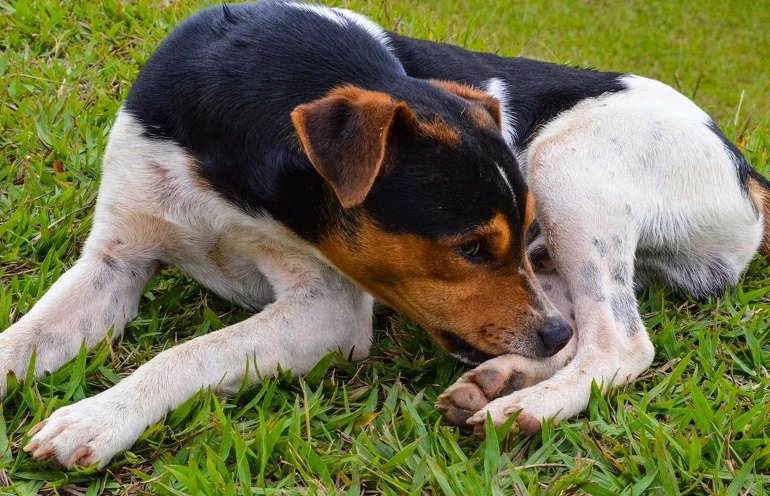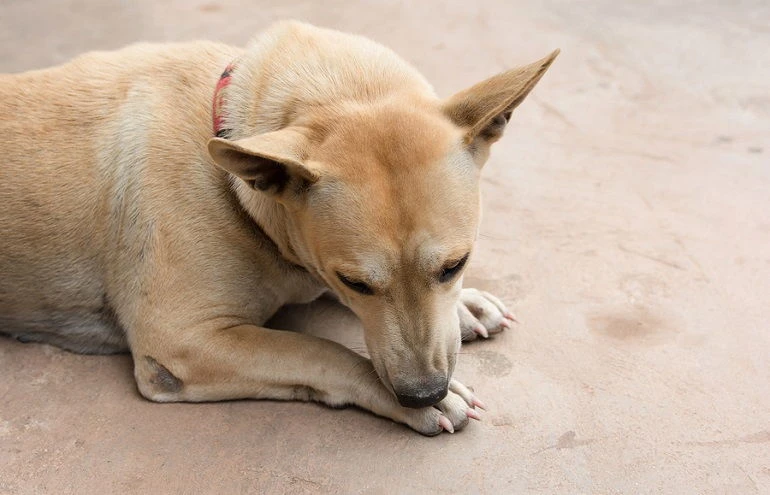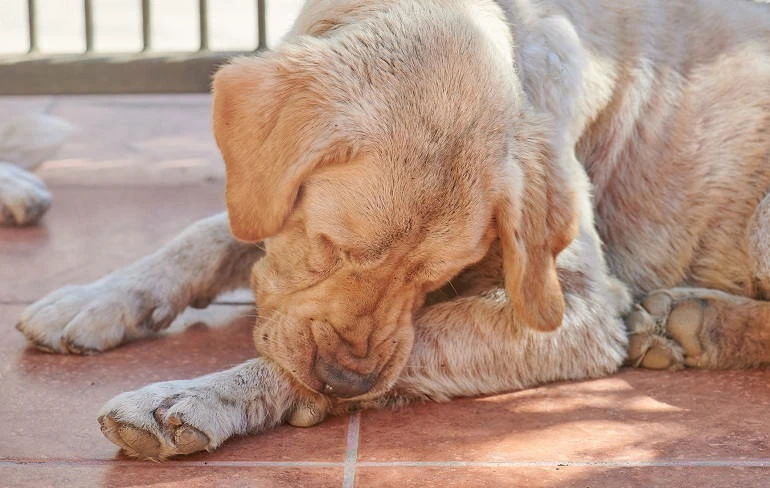Why Do Dogs Chew On Their Paws? 5 Reasons and What to Do
by Tom Ken
It can be very troubling to watch your dog chewing its paws. But while it might seem weird why the pup would do something that looks painful, it is often a way to soothe itself when going through some form of distress. There are various reasons why dogs chew their paws, and here we look at some of the main ones and how to deal with the issue.

1. Injury
Injury is one of the most common reasons why many dogs chew or lick their paws. When nursing a wound in the toe pads or the pet has a fractured claw/toe, it often licks it to get some relief from the pain.
Typical causes of paw injuries include cuts from sharp objects like rocks and splinters. For overly active pups and those that run off-leash on unfamiliar terrains a lot, paw injuries can be quite common.
What to Do: If you suspect the dog has a paw injury causing it to lick or chew on it, the first step should always be to inspect it and check the issue's extent. Also, check whether there are still foreign materials like rocks between the toes that can cause further injury. Depending on the injury's extent, you can treat it at home or talk the pet to a vet.
2. Dry Skin

Like humans, dogs also experience dry skin during the winter months. Dry skin is also a common problem for pets that live in an arid climate. When the skin dries out, it becomes itchy, and if the dry skin is around the paws, it can appear like the pet is chewing them as it licks it to relieve the itchiness.
Besides the weather or climate, dry skin can indicate your pup is not getting an adequate amount of fatty acids in its diet. Fatty acids are essential for keeping a pet's skin and coat healthy and flexible.
What to Do: For dry paw skin, the best thing you can do is keep it moisturized with a skin balm. Also, adding avocado, coconut, or olive oils to a dog's diet can help supply the fatty acids required to keep the skin healthy.
3. Allergies
Food and other types of allergies are quite common among dogs. Some pups even get allergic to other things like cleaning products. One of the effects of these allergies is skin irritation, which most dogs react to by licking or chewing on the irritated area.
What to Do: Here, the most important thing to do is identify what is causing the allergy. If it is a specific type of food, you should stop the pet from eating it. But, if the allergic reaction is more severe, it is essential to talk to your vet.
4. Parasites

When your dog has parasites like mites, ticks, or fleas, it often feels itchy as they irritate its skin. Most pups address this problem by chewing or aggressively licking the itchy spot.
If the parasites are on their paws, dogs can chew them to remove the nasty creatures. Ticks are easier to spot, so it is easy to tell when they are causing your pet problems. Mites and fleas are hard to see without viewing closely.
What to Do: A regular treatment for parasites like fleas and ticks is essential for most dogs. Therefore, if your dog is not under treatment, you should start it the soonest possible to deal with parasites.
5. Mental Health Issues
Paw chewing can sometimes be a result of mental health issues. If your dog has problems like anxiety or depression, it often over-grooms. Licking paws can soothe the pet's nervous system temporarily when facing one of these mental health issues.
What to Do: Mental and physical stimulation are the best ways to deal with mental issues like anxiety and depression. Socializing your pet and ensuring you do not leave it alone for long periods can also help.
Conclusion
Dogs cannot help but lick themselves, as this is part of their natural way of grooming. However, some behaviors like chewing on paws are a source of concern. When you notice excessive paw chewing, you need to identify the cause. The underlying causes range from injuries to mental issues. Once you know them, you have to look for the best solution before the problem escalates.
 |
 |
 |
 |

About Tom Ken
Tom has worked with many veterinary surgeons as a nurse at different veterinary clinics throughout his life.
There, he provides care for sick animals; such as: dogs, cats, rabbits, birds, hamsters, guinea pigs, and sometimes reptiles.
He has good work ethics and gentle hands; hence, the doctors as well the pet owners have come to love his presence alot.
With this site, he aims to help the readers ensure their pets' wellbeing, learn how to care, and proivide medical treatment as needed.
Joshua received Veterinary Technician Degree at Purdue University in West Lafayette, IN.
Thoughts on "Why Do Dogs Chew On Their Paws? 5 Reasons and What to Do"
 |
 |
 |
 |
Pet Care Tips
You can Get FREE Gifts. Furthermore, Free Items here. Disable Ad Blocker to receive them all.
Once done, hit anything below
 |
 |
 |
 |